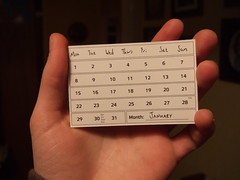In my earlier article on Managing your Lifestyle Inflation, I mentioned something which Karen Datko at Smart Spending seemed to click with. She said:
Andrew suggests that you look at expenditures you started making after your pay went up. "If you didn't have these things before, then you can probably still do without them now," he writes.
That was just a small part of my previous post but it is an interesting one. Essentially by sticking to your same budget, even after you get a pay-rise, then you are recognising this extra income for yourself and actually paying yourself first before adding to your lifestyle expenses. By swiping the extra into your savings account and not spending any more than before then you are managing your lifestyle inflation.
Lifestyle Deflation
More importantly though, you also need to look at downsizing your lifestyle too. There's no point just starting from now and saying "When I get future pay-increases, I won't spend that", it actually needs to start before then. After all, maybe your lifestyle expenses are already too inflated ... usually this is the point at which you're spending everything you earn or even worse and spending more than you earn.
Instead, you should review your life as it is now. Look for the simple things you can remove and also go over your regular expenses to see which you can cut down or at least cut back on. I mean things like whether you increased your cable subscription to include more channels the last time you got a pay-rise. Do you even watch them? I bet not.
Expanding your Savings Range
This year I managed to get a pay-rise but instead of spending more, I actually started removing a number of (unnecessary) things from my life. The latest item I removed was my car seeing as I hardly ever used it. In total, I think I'll actually be up around $200 every single month now that all those car expenses are gone.
Both my pay-rise and my ability to cut out unnecessary things are actually expanding my savings range. I'm spending less of what I earn and therefore saving more. I'm also earning more than before and my savings increase there too. It's funny since I don't miss anything I cut out and instead I have replaced them with other more frugal activites.
When the Economy Improves
Karen also suggests something which should also be added to this list of things to do. Firstly, we're not succumbing to lifestyle inflation, in fact we're actively managing lifestyle deflation and to add another thing into the equation, especially for the current environment, Karen says:
We suggest that if you're cutting back in anticipation of the worst, you consider carrying that new budget forward when the economy improves (and it will).
With an improved economy, you may think that we are out of the woods and home-free but in reality it's still a long way to go to reach your prosperous and financially independent future-self. So instead of madly spending like others will when the economy is looking brighter, just quietly go about your usual still frugal way of life. And instead of reveling in the spend-happy new environment just take a moment to revel in the new and improved ways the new economy will help you save even more money and further reduce your lifestyle expenses.
P.S. After writing this article, I found that The Tao of Making Money previously mentioned Lifestyle Deflation in an article back in Feb 2008, though I can't find any other references to link to.
Any others articles about 'Lifestyle Deflation' you know about? What are you doing to actively manage your lifestyle expenses?





